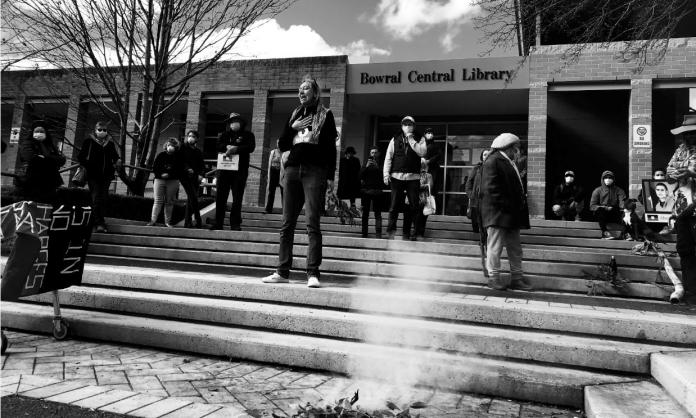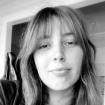Sun and anger fill the Bowral library forecourt. Black four wheel drives with “riot squad” written on the side sit ominously out the front.
It is 21 June and around 60 people have gathered for a Black Lives Matter rally. Gundungurra elder Trish Levett surveys the attendees as smoke from burning eucalyptus leaves drifts in the air. Cops in dark blue uniforms swarm behind the demonstrators and she starts a chant: “Too many gungies [cops], not enough justice!”
Bowral is one of the whitest towns in Australia, and one of the richest in the Southern Highlands region of New South Wales. Rolling hills and multi-million dollar mansions make it a popular choice for wealthy retirees and professionals from Sydney and Canberra looking for a weekend house. A 2016 Weekend Australian article described a morning tea at Bowral library where the heavily Liberal voting population’s key concerns about the coming election were “miserable superannuation returns and the changes to tax concessions”.
Very different concerns are being aired today. After an introduction by Trish and more chants, various community members speak about racism, Black deaths in custody and the killing of George Floyd.
A young woman holds a placard bearing a photo of her brother, Tane Chatfield. Tane died in police custody in 2017 at the age of 22. His family took photographs of his body, which they say showed the marks of battering. “He had skin under his nails. He had scratch marks on his body”, his father told Sydney Criminal Lawyers at the time. “There were bruises all over his face, a busted lip and a practically broken nose and jaw.” Corrective services told the public that he committed suicide. His family doesn’t believe it.
After the chants and spontaneous speeches, the crowd is ready to march. One of the cops walks into the protest and reads a move-on order. Protesters quickly discuss what to do. Trish eventually declares that the protest will, in fact, move on, by marching out of the square and onto the street. Then the cops close in. They insist that attendees leave only as individuals. The protesters proceed to leave as individuals, only to gather on the road and begin a march down the town’s main street.
As the march progresses, chants and excitement fill the air. People stop to stare, crowds come out of cafes to stand and watch the spectacle. Every shop has a huddle in the doorway, straining to get a look.
“Say their names! Tanya Day! David Dungay Junior! Kumanjayi Walker! Tane Chatfield!” The names of those killed in police custody are shouted by the crowd as the march proceeds down and back up the main street. It ends with chants of “We’ll be back!”
As things wind down, Bandjalung artist Djon Mundine tells Red Flag “We’re very emotionally moved”. He’s lived here for around nine years, and this is only the third protest he’s known of here, and the first for Aboriginal rights.
“I don’t think anyone here thinks any Aboriginal people even exist here. It’s a really white neighbourhood. They shot everyone to clear the land ... Hundreds of thousands of people were shot. Not just starved, but shot. And this is the way they kill us now – by putting us in jail.” Elders tell of the massacre sites around the area, not officially acknowledged, but knowledge of them is passed orally down the generations.
But tragedy and horror are not the only things that are remembered: resistance is too. Hopefully today will be remembered, as Djon puts it, as “the day the riot cops came to Bowral”.









